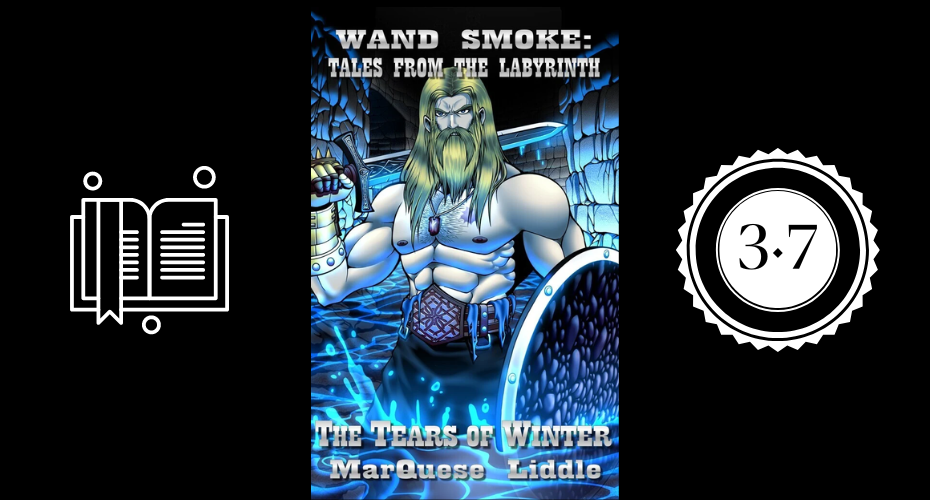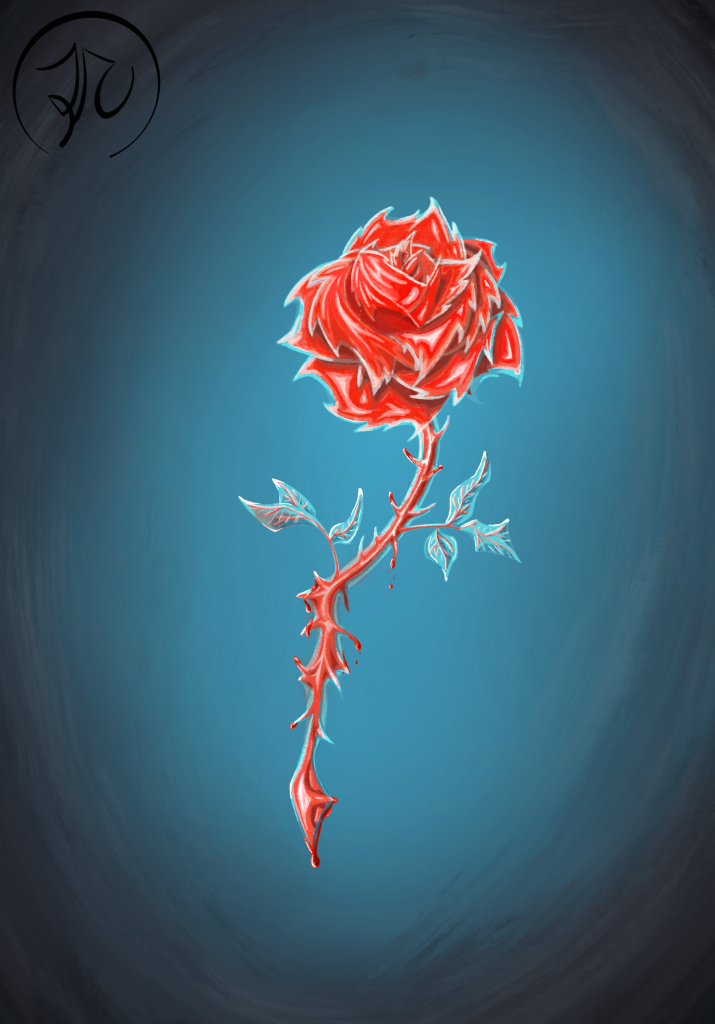
3.7
In essence, a cocky young man who is tired of his job as a scribe is lured into a false quest by lust. Sieg the Poet, the champion of focus in this short story, is a scribe of little worldly experience brimming with a fool’s confidence after he sees the witch Titania on Mount Hel. Consumed by a hollow drive for her beauty, he throws himself at his society, the wilds, and demons until the real world finally catches up with him. Though it takes having sense beaten into him several times, he eventually admits to himself that his quest was foolish and arrogant, giving him the strength to rise against the odds ahead of him.
I’d elaborate further, but to do so would cause spoilers as this is a short story with about 30 pages. It’s structured very much like a condensed Greek or Nordic myth, and it reads similarly in language as well. This style is also very dense, so despite how short it is, it takes more time to read than you might expect. The prose is well written, though I will say that this is not the type of story I usually read, so I am a bit outside the target audience. If you enjoy ancient folktales, then this would be the fable for you.
There’s clearly a great deal of world building put into this. Sieg’s story is just a small footnote in the history of this world, and even without having read any of MarQuese’s other books, it’s clear that this is a world with many intricacies, magic systems, and complex political backgrounds that aren’t focused on in The Tears Of Winter.
————————— Spoiler Section —————————
Favorite Scene:
“Sieg sat up straight, equally amazed that a fay would willingly scorch itself with iron as he was to discover that a bit of its blood could instantly heal broken bones. The only thing more shocking was that nobody ever told him, nor was it mentioned anywhere in the tapestries that faerie blood possessed such miraculous properties. Surely, he thought that the champions must have known given how many trolls and salamanders they’d slain.
They hadn’t, incidentally. Maybe in times more ancient, they’d known; but during the life of my great, great grandfather, the substance was deemed blasphemous and associated with curses. Religious fools. They forgot the reasons for their traditions and built extraneous prohibitions out of fear—a sign of decline, weak and stupid men banning all which they do not understand. It was inevitable that the Skræling would take them. They deserved their end at the hands of the savages…”
This, I think, was the best picture of the empire that the book took little time to speak on. It was worldbuilding shown through the eyes of someone who didn’t have all the information, displaying the flaws in the culture’s mindset about the world and the lies of their “heroes”.
Thoughts:
For how lengthy the beginning and middle were, it seemed like the last few pages were on the rushed side of things. Less detail and less resolution to the final conflict, leaving the reasoning behind Sieg’s and Titania’s sudden changes in goals a bit blurry.
I was hoping Sieg would kill her. I feel like some of Sieg’s character arc was squashed by not slaying her. She was horribly evil and he had no reason to love her but for how arousing she looked. And what reason did Titania have for choosing Seig anyway? A poem? Surely his was but one of many such flowery words spoken to her by the dozens of men she’d lured into her lair over the years. I don’t see why his swayed her from toying with the lives of men to settling down to marry. And besides, how would you trust such a woman with being your spouse or a mother after how obviously evil and manipulative she is? Just a personal preference on my part, I suppose.
Characters:
Sieg:
He came to conclusions, but there was little time spent on how and why those conclusions were reached, making him less relatable. This is mostly also due to style, mimicking the way that myths and legends are told. The narration style also limited such a personal side to the story since it was told by Sieg’s great-great grandson.
Sieg’s personality had little time to show its mature side, and that maturity seemed weak in the end because he chose to marry Titania instead of slaying her — or at least parting ways with her. His character would’ve been more satisfying if he had truly changed. However, this is perhaps intentional since Sieg’s descendant comes off as a somewhat ill-intentioned man himself, and so Sieg’s failure to end her is perhaps spread down through the generations into creating this possibly corrupt offspring. It’s difficult to judge since there isn’t much from this descendant’s perspective added in, but the air he gives off is that of someone power-hungry and destructive.
In the end, Sieg had a path toward true heroism, but he became a somewhat corrupt champion just like his kin — though somewhat less potently so. Perhaps it’s just a personal preference on my part, but I don’t think saving one life can account for all the wrongs Titania committed. Sieg suffered a great deal — and even though much of that was indeed his own fault — he could’ve slain that false idea he’d been consumed by and risen above his past naivety.
Duane:
I’d like to know more about Duane the Dwarf. He seemed like an interesting character with stories in his past. He was probably my favorite despite how little focus time he had. He seemed to be the only entity in the story that wasn’t either confused or consumed by some corosive ideology or desires. He was not a good entity, mind you, but he was clear-sighted and aware of himself and the world in a way the other characters were not. The rest of the characters seemed less like real people compared to him.
Titania:
The evil witch that draws out lustful fools. She’s immortal, bored, and (I assume) trapped on the mountain by Zmeu, and uses that situation to play with men like a cat toys with mice. In the end she revives Sieg, but I couldn’t say why. It seemed her reasoning was a bit thin. She seemed to love his poem, or perhaps his determination, but surely he wasn’t the only person who had ever said flowery words to her given what she was. Aside from that one moment of repentance at the end, she has no substantive qualities except for being physically alluring, so I don’t see how she’s worthy of anyone who’s suffered as much as Sieg has even if his suffering was mostly self-inflicted.
As always: MEMES





I can’t feasibly do this for every review, but from time to time I might add a little fan art for the books I read. In this case, Titania’s crystal rose hit me with some inspiration, so… hope it’s somewhat accurate to what you had in mind when you described it, MarQuese!
